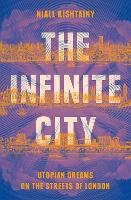


|
|
| book details |
The Infinite City: Utopian Dreams on the Streets of London
By (author) Niall Kishtainy

|
| on special |
normal price: R 813.95
Price: R 772.95
|
| book description |
‘Glorious’ GUARIDAN 'Vigorous, rigorous and eminently readable’ SPECTATOR London is a city of dreamers. A city of possibility and experiment. A city of fervent imaginings and courageous aspirations. For centuries, it has been the capital of utopian thought. The Infinite City tells this history for the first time. In his soaring new book, Niall Kishtainy draws us into the imaginative worlds of Thomas More, the Diggers, William Morris and Extinction Rebellion protestors. He introduces us to thinkers like Thomas Spence who threw coins stamped with the words ‘YOU FOOLS’ into the alleys of Holborn. To Ada Salter who was the first woman borough councillor in London and ignited the Bermondsey Revolution. To ninety-two-year-old Dolly Watson who became the queen of Claremont Road in Leytonstone during the Reclaim the Streets protests in the 1990s. These are inspiring tales of people who drew might from the city around them and fought for their ideologies in an increasingly transforming world. Beginning in the sixteenth century and stretching from the contemporary transformation of the East End docklands to the COVID lockdowns, The Infinite City shows how London’s spirit has been one of visionary imagination amid relentless change and innovation.
| product details |

Normally shipped |
Publisher | HarperCollins Publishers
Published date | 20 Jul 2023
Language |
Format | Hardback
Pages | 368
Dimensions | 240 x 159 x 35mm (L x W x H)
Weight | 1020g
ISBN | 978-0-0083-2585-5
Readership Age |
BISAC | philosophy / political
| other options |
|
|
|
To view the items in your trolley please sign in.
| sign in |
|
|
|
| specials |
|
|
|
An epic love story with the pulse of a thriller that asks: what would you risk for a second chance at first love?
|

|
Mason Coile
Paperback / softback
224 pages
was: R 520.95
now: R 468.95
|
A terrifying locked-room mystery set in a remote outpost on Mars.
|
|
|
|